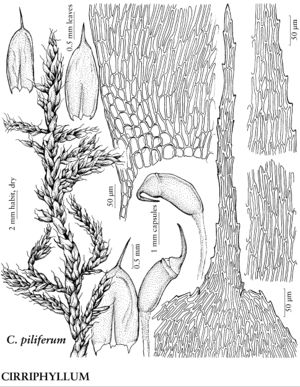Cirriphyllum
Bull. Torrey Bot. Club 25: 222. 1898.
| Taxon | Illustrator ⠉ | |
|---|---|---|
 | Cirriphyllum piliferum | Patricia M. Eckel |
Plants large, in loose tufts, light green or whitish. Stems creeping, densely to moderately densely terete-foliate, usually julaceous, regularly pinnate, branches terete-foliate; central strand present; pseudoparaphyllia acute; axillary hairs of 3–5 cells. Stem-leaves erect, loosely imbricate to somewhat spaced proximally, closely imbricate near shoot apices, ovate or elliptic proximally, strongly concave, not or slightly plicate; base broadly long-decurrent; margins serrate to serrulate; apex abruptly tapered, piliferous; costa to 30–60% leaf length, moderate to somewhat stout, terminal spine absent; alar cells subquadrate, enlarged, region pellucid; laminal cells linear, walls thick; basal juxtacostal cells shorter, sometimes broader. Branch leaves similar, smaller, narrower, or often more gradually tapered and twisted just below apex. Sexual condition dioicous; perichaetial leaves abruptly contracted to long, reflexed acumen. Seta dark-brown, rough. Capsule inclined to horizontal, brown, ovate to elongate, slightly curved; annulus separating by fragments; operculum long-rostrate; peristome xerocastique, perfect. Calyptra naked. Spores 12–15 µm.
Distribution
North America, Eurasia, Africa, Atlantic Islands, widespread throughout boreal to north temperate zones and subalpine regions
Discussion
Species 3 (1 in the flora).
Grout segregated Cirriphyllum from Eurhynchium, accepting four species in North America. H. Robinson (1962) transferred C. brandegeei and C. cirrosum to Brachythecium and C. illecebrum to Bryoandersonia. Phylogenetic analysis by M. S. Ignatov and S. Huttunen (2002) and Ignatov et al. (2008) supports these transfers. Cirriphyllum boscii is a synonym of Bryoandersonia illecebra.
Selected References
None.
Lower Taxa
"long" is not a number."broad" is not a number.